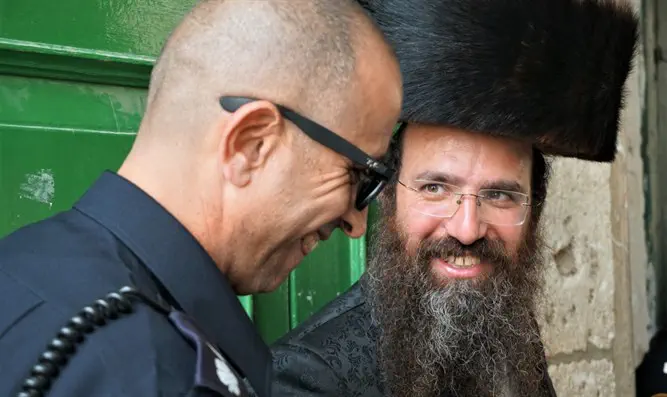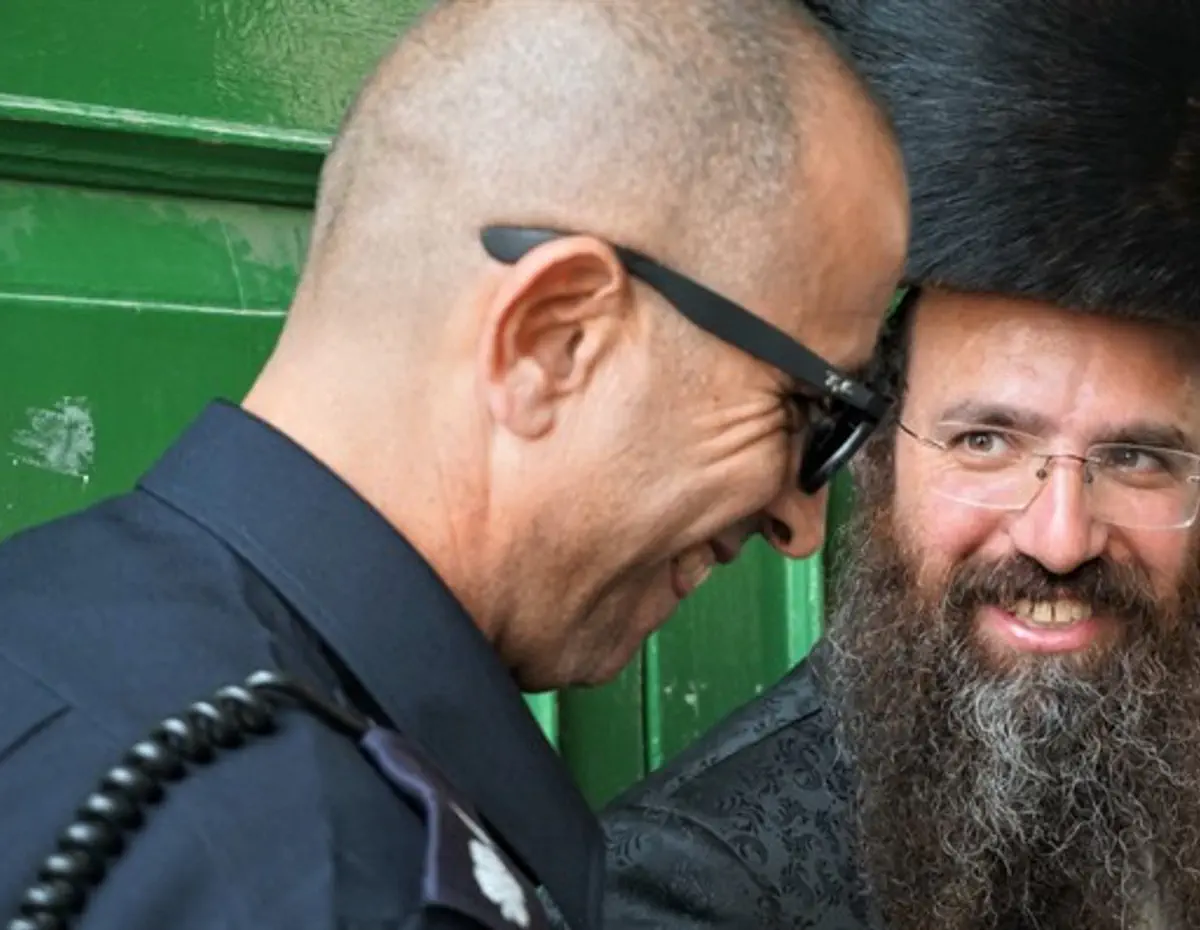rylah
Gold Member
- Jun 10, 2015
- 21,143
- 4,483
- 290
The quiet revolution on the Temple Mount casts a spotlight on Rabbi Shimshon Elboim, one of the leading Jewish Temple Mount activists.
Part of a larger effort by the Matte Irguni HaMikdash, an umbrella group uniting various Temple Mount activist groups, Israeli authorities now meet regularly with activists to coordinate policy, as the number of Jews visiting the Temple Mount every year increases.
Restrictions on visitors have gradually been eased, including an unofficial end to the prohibition on Jewish prayer on the Temple Mount.
One of the key figures responsible for these changes is Rabbi Shimshon Elboim, a long-time activist and son of Rabbi Yosef Elboim, one of the first Jews to visit the Temple Mount after Israel liberated the Old City of Jerusalem in June 1967.
According to his close friends, Rabbi Shimson Elboim first visited the Temple Mount when he was a baby, brought there by his father. Today, he is one of the main activists working to make the holy site more accessible to Jewish visitors, and sits at the helm of the Matte Irguni HaMikdash.
To help strengthen the Jewish presence on the Temple Mount, click here to donate to the Matte Irguni HaMikdash.
The Matte carries out extensive public relations work to increase public awareness of the history and Jewish law relating to the Temple Mount, organizes group visits, and coordinates policy with Israeli authorities.
Among its other activities, the Matte Irguni HaMikdash operates a joint steering committee with Israeli police. Established under the leadership of Rabbi Shimshon Elboim, the steering committee keeps a line open for dialogue between authorities and activists, allowing them to resolve issues as they arise, and enables activists to coordinate their activities with the police.
The establishment of the steering committee has led to significant changes in police policy regarding Jewish visitation to the Temple Mount, ending what had been a tense relationship between the police department and Temple Mount activists. Muslims who harass Jewish visitors to the Mount are now detained by police and often are barred from the Temple Mount for months at a time.
In addition, police now, unofficially, permit quiet Jewish prayer on the Temple Mount, something previously prohibited.
Rabbi Elboim credited the growing numbers of Jewish visitors to the Mount for the changes.
“The credit goes to the tens of thousands of visitors to the Temple Mount, to the police commanders, to the recent Public Security Ministers, and to the members of the steering committee. Everyone together are responsible for the changes on the Temple Mount, which make it possible for anyone to visit, to experience the holiness and to bring Israel closer to the site of the Temple, which was neglected by the government for 48 years after its liberation.”
Berale Crombie, a strategic adviser and advertiser who has been visiting the Temple Mount regularly for the past few years, told Arutz Sheva that “Every time I visited the Temple Mount, I met Rabbi Elboim at the entrance. He’s always there, in any weather, with a smile on his face, and makes sure everything goes as it should, and courteously goes with visitors to guide them.”
“If someone deserves an award for their work on behalf of Israeli sovereignty on the Temple Mount, it is Rabbi Elboim, who has helped to significantly increase the number of visitors to the Temple Mount, and is responsible for the fact that Jews can now have more pleasant visits to the Mount. He is the man responsible for Jews being able to pray on the Temple Mount. This is the life’s work of a modest man who is totally dedicated to the cause of the Temple Mount.”


 www.israelnationalnews.com
www.israelnationalnews.com
(Comment)
Tish'ah B'Av starts tomorrow night,
the day we mourn the destruction of the two Temples.
However, though the moth of Av is currently the most sorrowful in Jewish calendar,
it is also set to be reversed into the happiest one, and specifically Tis'ah B'Av to become a day of celebration.
One of the greatest sorrows is that we don't even realize the extent of our loss, the numb heart yearns for something it has only a vague distant recollection of what it was, like unsettling love for a woman from lives away...
But with all this heaviness, I just can't help but notice the increasing excitement of anticipation in the air. Especially to see the kids ascend the Mount and prostrate for the elders to see and awaken the nation.
Just think about it - there're now more Jews present on the Mount in a decade,
than throughout the last 2000 years.
Part of a larger effort by the Matte Irguni HaMikdash, an umbrella group uniting various Temple Mount activist groups, Israeli authorities now meet regularly with activists to coordinate policy, as the number of Jews visiting the Temple Mount every year increases.
Restrictions on visitors have gradually been eased, including an unofficial end to the prohibition on Jewish prayer on the Temple Mount.
One of the key figures responsible for these changes is Rabbi Shimshon Elboim, a long-time activist and son of Rabbi Yosef Elboim, one of the first Jews to visit the Temple Mount after Israel liberated the Old City of Jerusalem in June 1967.
According to his close friends, Rabbi Shimson Elboim first visited the Temple Mount when he was a baby, brought there by his father. Today, he is one of the main activists working to make the holy site more accessible to Jewish visitors, and sits at the helm of the Matte Irguni HaMikdash.
To help strengthen the Jewish presence on the Temple Mount, click here to donate to the Matte Irguni HaMikdash.
The Matte carries out extensive public relations work to increase public awareness of the history and Jewish law relating to the Temple Mount, organizes group visits, and coordinates policy with Israeli authorities.
Among its other activities, the Matte Irguni HaMikdash operates a joint steering committee with Israeli police. Established under the leadership of Rabbi Shimshon Elboim, the steering committee keeps a line open for dialogue between authorities and activists, allowing them to resolve issues as they arise, and enables activists to coordinate their activities with the police.
The establishment of the steering committee has led to significant changes in police policy regarding Jewish visitation to the Temple Mount, ending what had been a tense relationship between the police department and Temple Mount activists. Muslims who harass Jewish visitors to the Mount are now detained by police and often are barred from the Temple Mount for months at a time.
In addition, police now, unofficially, permit quiet Jewish prayer on the Temple Mount, something previously prohibited.
Rabbi Elboim credited the growing numbers of Jewish visitors to the Mount for the changes.
“The credit goes to the tens of thousands of visitors to the Temple Mount, to the police commanders, to the recent Public Security Ministers, and to the members of the steering committee. Everyone together are responsible for the changes on the Temple Mount, which make it possible for anyone to visit, to experience the holiness and to bring Israel closer to the site of the Temple, which was neglected by the government for 48 years after its liberation.”
Berale Crombie, a strategic adviser and advertiser who has been visiting the Temple Mount regularly for the past few years, told Arutz Sheva that “Every time I visited the Temple Mount, I met Rabbi Elboim at the entrance. He’s always there, in any weather, with a smile on his face, and makes sure everything goes as it should, and courteously goes with visitors to guide them.”
“If someone deserves an award for their work on behalf of Israeli sovereignty on the Temple Mount, it is Rabbi Elboim, who has helped to significantly increase the number of visitors to the Temple Mount, and is responsible for the fact that Jews can now have more pleasant visits to the Mount. He is the man responsible for Jews being able to pray on the Temple Mount. This is the life’s work of a modest man who is totally dedicated to the cause of the Temple Mount.”


The man responsible for Jews being allowed to pray on the Temple Mount
The quiet revolution on the Temple Mount casts a spotlight on Rabbi Shimshon Elboim, one of the leading Jewish Temple Mount activists.
(Comment)
Tish'ah B'Av starts tomorrow night,
the day we mourn the destruction of the two Temples.
However, though the moth of Av is currently the most sorrowful in Jewish calendar,
it is also set to be reversed into the happiest one, and specifically Tis'ah B'Av to become a day of celebration.
One of the greatest sorrows is that we don't even realize the extent of our loss, the numb heart yearns for something it has only a vague distant recollection of what it was, like unsettling love for a woman from lives away...
But with all this heaviness, I just can't help but notice the increasing excitement of anticipation in the air. Especially to see the kids ascend the Mount and prostrate for the elders to see and awaken the nation.
Just think about it - there're now more Jews present on the Mount in a decade,
than throughout the last 2000 years.



